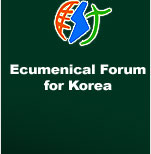|
| Home > About > History of Formation |
 |
 |
In the spirit of the churches’ commitment to peace and reunification expressed in the Tozanso process since 1984, the 'Ecumenical Forum for Peace, Reunification and Development Cooperation on the Korean Peninsula' (in abbreviation, the Ecumenical Forum for Korea) serves as a cooperative endeavor of churches, national councils of churches, mission organizations and church-related development agencies in cooperation with the WCC, CCA and other ecumenical bodies. The Ecumenical Forum for Korea was launched through its first meeting on December 8, 2006 in HongKong, attended by 25 participants representing churches and ecumenical bodies around the world.
|
|
|
The ecumenical meeting in Tozanso in 1984 which was initiated by the WCC became the first opportunity for the world-wide ecumenical churches and organizations to show their concern on and to take a leadership with the issue of peace and reunification on the Korean peninsula. As a result, North and South Korean Christians first met in 1986 in Glion, Switzerland under the auspices of the WCC. This movement of the ecumenical community around the world has played an important role through prayer and cooperation for reconciliation and peaceful reunification in the Korean peninsula. We believe that these efforts have brought with the result that threats of war on the Korean peninsula has decreased, dialogues and mutual visits between the North and the South through various channels has increased, and the way of reconciliation and cooperation has been opened. As you have been informed, the summit meetings of the North and the South(in 2000 and in 2006), and economic cooperation in various dimension has brought a new era on the Korean peninsula.
In 1995 when serious floods ravaged North Korea, manychurches and church agencies including South orean churches began to respond to appeals for food assistance. However, after years of experience in providing food aid, they began to realize that the causes of the food shortage in North Korea went beyond natural disaster and agricultural input, and that there must be basic rehabilitation of the infra structure and revival of every sector of the economy in order to overcome North Korea's chronic food shortage.
In addition to that, it is recognized in general that among churches and organizations supporting the North there have been many negative aftereffects such as loss of mutual trust, duplication of supporting items and money, money centered support due to lack of information sharing, mutual cooperation, and evaluation process.
|
|
|
|
|
|
